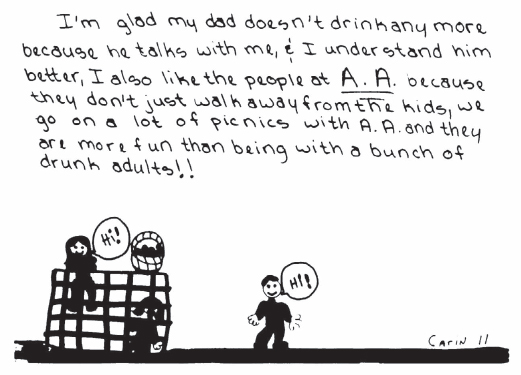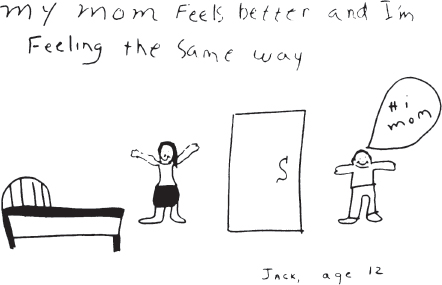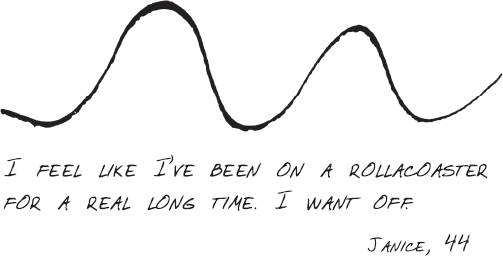CHAPTER NINE

Healing Resources
No one heals in isolation. Addiction and its impact on others is a disease of disconnection. Disconnection from others and disconnection from self. To heal, people need others to begin and sustain that process. Recovery is about connection, connection to self and others.
“Yes, but … yes, but … it wasn’t that bad. Yes, but … no one would really understand. Yes, but … I have been out of the home for years now. Yes, but … I do really love my parent(s). Yes, but … Others have it worse.” Those are often the spoken words or the inner dialogue that occurs when the adult child starts to think about reaching out for help.
There is always someone who has suffered more loss, experienced more trauma than you. But that does not negate your pain, your loss, your trauma. There are people who understand and it doesn’t matter how old you are. You are not betraying your mother, your father, or your family by owning your truth. If there is an act of betrayal, it is with the disease, the addictive disorder. If there is an act of betrayal, it is with yourself if you do not allow yourself to heal. You deserve to heal from the pain of the past. You deserve to no longer live a script but to live with choices.
“I do want recovery, but I want it to be pain-free, thank you.” “I want recovery, but I prefer to do it by myself.” These are two examples of resistance that adult children often present as they think about contemplating addressing their family of origin issues. These two resistances speak to the fear of feelings and using self-reliance as a defense. For many years, staying away from feelings has worked, for a while. No longer. Self-reliance is a nice attribute but rigid self-reliance is based on not being willing to trust others.
For a moment, imagine the depth of your pain and grief as a strong forceful wind. If you were to stand in the face of the wind, feet and legs held tightly together, back rigidly straight, and arms down by your side, it would easily blow you over. You are probably smart enough to realize that and run for shelter. Most of us run for shelter through work, relationships, drugs or alcohol, sex, or use of money. But if you were to lean forward with feet slightly apart, knees bent, arms slightly away from your body, you may find yourself swaying in the face of that strong wind, but you don’t have to run or be blown away. You now have the potential of finding your strength as you remain standing.
In addition to balance and flexibility, it is even more likely you will be able to remain standing with the support and help of others. To live in an addictive family is to live a life of isolation. You have known isolation for too long. You deserve to allow others to be a part of your process. They will also shine the light and provide the hope when that is difficult to do for yourself.
Reaching out and making that first contact with a helping resource is a big step. The act of searching the internet for a name, sending that inquiry via email, picking up the phone, dialing the number, and asking to speak to someone who can help only takes seconds. The process that leads to reaching out for help—the debates with yourself, telling yourself you can handle the problems alone, the never-ending, continuous cycle of fear, anger, loneliness, guilt—all have taken their psychological and physical toll on you and your family. Allowing others to be a part of your process and seeking support is a sign of strength not weakness. It is a sign of self-respect and worth, believing you are deserving.
Resources
Twelve-step groups are the most common type of mutual support groups for people who want to recover from any addiction and its familial impact. In the Appendix, a list of twelve-step fellowships is provided along with contact information. Self-help groups involve no professional counselors and do not document one’s involvement. They are free of charge to all who wish to participate. They are groups made up of people who identify with a common problem and are looking for a common solution, a way of helping themselves and each other. Participating in a group process with others who identify with similar issues helps you learn to value yourself, to overcome fears, to begin to trust in self as well as others.
These fellowships have demonstrated themselves to be extremely helpful resources for millions of people worldwide. They provide opportunity for children, partners/spouses, or the addicted person to better understand the addiction and how it is affecting their lives. They offer every member a program of recovery, allowing each individual an avenue for feeling better about him- or herself and helping him or her continue to live more a productive life. Self-help groups offer people an opportunity to realize their experiences and feelings are not unique but, in fact, very similar to problems that each member of the group has experienced.
The validation that occurs within a group setting reduces shame. The dysfunctional family rules of Don’t Talk, Don’t Trust, and Don’t Feel are broken. When the principles of the programs are practiced people learn compassion for self, personal accountability, self-forgiveness, self-respect, and honesty. In this process you find your way to honoring yourself.
An important unifying aspect of these groups is that they practice a rule of anonymity. This means your name, your job, or your status in the community are not relevant. The unemployed are as important as the employed, the less educated are as important as the more educated. Last names are not used. Everyone is considered equal with fellow beings who suffer the same as you.
Al-Anon and Nar-Anon are twelve-step groups for family members. While partners, spouses, and parents tend to be the family members most in attendance, both groups are open to all family members. Many adult children have embraced Al-Anon, a program that began in the 1950s, and find strength in its longevity. It has created literature specifically for the adult child.
Adult children have also embraced the programs of ACA (Adult Children of Alcoholics/Dysfunctional families). ACA began in the latter
1980s and has experienced a resurgence today. Its Big Book, first published in 2006, often thought of as the Red Book, has given the program both breadth and depth.
Codependency Anonymous has remained another popular twelve-step group for adult children and partners with its focus on relationships.
There are twelve-step meetings for nearly all addictive disorders, and many are listed in the Appendix.
Not everyone feels comfortable in a twelve-step meeting. And there are other options of self-help particularly for the addicted person. Rational Recovery, SMART, Women for Sobriety, are the most well-known non-twelve-step programs and most available in the urban areas.
Also many recovery groups offer options for online meetings. With the pandemic of 2020, utilizing online resources has proven invaluable and is likely to become more integrated into people’s recovery practices.

Some adult children find they need the support and structure of treatment programs for their addiction and/or mental health issues, most specifically depression, self-harm, or anxiety. When issues are less acute, it may be possible to find a workshop format that helps you. Workshops usually range from three days to two-week stays. These are usually recommended when you want more structure and more concentrated time than what outpatient psychotherapy may offer.
Adult children strongly benefit from psychotherapy. My bias is we can all benefit from therapy, but I would strongly suggest it if you:
• Are experiencing signs of depression and anxiety.
• Are engaged in a pattern of self-destructive behaviors that can range from victimization in relationships, repetitive painful relationships, and self-harm.
• Have attempted to make constructive changes in your life and have been unable to do so.
• Have a history of physical or sexual abuse.
In seeking psychotherapy I recommend working with a trauma-informed therapist who understands addiction in the family, is familiar with the concepts of being an adult child, and understands codependency.
If you are engaged in behaviors such as spending, gambling, gaming, porn and other sexual acts, etc., that are interfering with major aspects of your life or you are using drugs and alcohol and having difficulty stopping when it is interfering in major aspects of your life—it is best you seek an addiction program or a therapist who specializes in addiction to make an appropriate assessment and can offer direction for level of care. That may be to continue with a specific therapist, it could be an intensive outpatient program, or it could also be an inpatient treatment program.
It is important to honor your coping mechanisms, they were critical to your survivorship. Recovery doesn’t involve being critical of what you needed to do to protect yourself while you were growing up.
Addicted people do achieve abstinence and find recovery; family members do get well, but first, you need to ask for help.

Resources for Children
People outside of the immediate family have a normal, and perhaps justifiable, fear of meddling in others’ family affairs. Problems between parents and children regarding dress codes, money, or behavior are usually resolved within the confines of the family unit. An outsider who takes sides invariably gets the brunt of ill feelings after family members have reconciled these minor differences. But addiction is not a minor problem. Becoming an ally to the child is perhaps the first step toward the possibility of his or her healing. You may not change the home situation, but you can be a vital source in helping children withstand the pressures of the confusion in their family. Play the role of the listener—listen, console, and help validate the child’s feelings. Offer guidance as it seems appropriate. But remember, the best guidance can be given by a qualified helping professional.
Children come into contact with people who play a variety of roles in their lives—parents, extended family members, friends, neighbors, teachers, counselors, doctors, judges—and each person is in a position to offer different kinds of help and support. The more people make themselves available as knowledgeable, skilled resources, the wider the spectrum and the greater the opportunities for help available to children, whether young, adolescent, or adult.
It is my hope that people not underestimate the amount of difference they can make in the life of a child, no matter how hopeless the situation may appear. A bond with a caring person is one of the most significant factors as to why some children from addictive families develop strengths and others do not. This is typically someone who allows that child to be age-appropriate, to not have to be the adult. This is someone who believes the child and will listen. Someone who says in words or behavior, “I care,” and “You are important to me.” This type of relationship allows that child to internalize worth and, as a consequence, reject the shaming behaviors and messages that may also be coming from a troubled family life.
Vanessa, who is now thirty-three, felt strongly about locating a counselor who had worked with her when she was only fifteen. At that time, Vanessa’s parents were living on the streets and she had been put into a group home for approximately three months. She now wanted to say thank you. When the counselor asked what she remembered specifically about the counseling, she replied, “I have no idea what you did, but I know that you loved me.”
Sometimes it is not what we do; it is what we feel and then have the ability to convey. Genuinely believing she was loved was the intangible gift this young woman hung on to and from which she found strength. That was more than she had ever experienced. And then she pulled out a journal and said, “You did ask me to keep a journal and to this day I do that.” The journaling was a daily source of release and possibly strength but having felt loved was most important.
It is my contention children growing up with addiction suffer unhealthy consequences due to lack of involvement with other people, not from concerned involvement.
Taking Responsibility
Children affected by addiction will be adequately addressed and helped only when we, lay people and professionals alike, begin to take responsibility. Everyone who has access to these children needs to take some responsibility. The possibilities are many and vary, from:
• Talk with a family member.
• Ask the board you sit on to address the issue.
• Ask a clergyperson to address this issue with peers.
• Ask a physician to identify the impact addiction has on a family when it is recognized.
• Develop specific treatment curriculum and programs for children of addiction.
• Discuss addiction when identified.
• Suggest and refer to resources when indicated.
These actions take a willingness to become involved. Do not underestimate the impact you have, no matter how limited in power or time. Few helping resources have all of the ideal means, staff, space, money, or time necessary to develop the comprehensive services desired. But if every one assesses what can be done with the means at hand, they can actualize resources on the spot. With even a little greater effort, intermediate and long-range goals can be developed. To say, “We just can’t do it all” is irresponsible behavior on our part, which is really saying, “We don’t care enough.”
Everyone who has access to a child needs to take responsibility. If you are willing to ask yourself what help you can provide, then you are taking the first step.
Together we can break the Don’t Talk rule and break the generational cycle of addiction.
